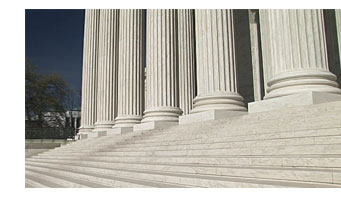 |
THIS ISSUE'S HEADLINES
Why Cyber Insurance Is Not Enough
Supreme Court Declares No More Agency Fees for Public Employees
Landmark Decision – Police Must Have a Warrant for Cell Phone Location Data

WHY CYBER INSURANCE IS NOT ENOUGH
Let one thing be resolved right away: cyber insurance is a good idea. Cyber breaches are an undeniable part of 21st century reality, and any business thinking that a robust Privacy and Security program will automatically shield it from a sanctionable event is engaging in a legal strategy known since Roman times as pium desiderium. Wishful thinking.
While there are often situations where any strategy is better than no strategy at all, when it comes to equipping your organization to deal with today’s cyber threats, a strategy of wishful thinking is the equivalent of no strategy at all. In the increasingly likely event that you find yourself preparing to brief your organization’s board on its response to an investigation by the HHS Office of Civil Rights, or FINRA, or the Wall Street Journal, expect to hear the question: "Are we insured for this?" Perhaps, unsurprisingly, any answer other than: "But, of course" may have an immediate impact on one’s job security algorithm.
 Nonetheless, while cyber insurance is a good idea, anyone relying on a cyber insurance policy as a stand-alone to protect an organization from harm badly misunderstands the nature of cyber insurance and the protection it provides. Nonetheless, while cyber insurance is a good idea, anyone relying on a cyber insurance policy as a stand-alone to protect an organization from harm badly misunderstands the nature of cyber insurance and the protection it provides.
To help business owners understand what cyber insurance is and what it is not, and to make informed decisions, PLDO Attorney Joel K. Goloskie has published an advisory, Why Cyber Insurance is Not Enough. The advisory explains why cyber insurance policies are not “off-the-shelf, one-size-fits-all” coverage agreement and why purchasing cyber insurance cannot be considered a front line defense to privacy and security risks. He also addresses the importance of having a robust compliance program through the lens of recent court decisions. To access the advisory, click here. For more information or assistance with your organization’s cyber security program, please contact Attorney Goloskie at 401-824-5100 or email jgoloskie@pldolaw.com.
[back to top]

SUPREME COURT DECLARES NO MORE AGENCY FEES FOR PUBLIC EMPLOYEES
For over forty years, public-sector unions could impose what were known as “agency fees” on non-members. The logic was that a union serving as the exclusive representative of a unit of employe es is required to represent the interests of all employees, union member or not. So the imposition of agency fees made a certain kind of sense: non-members benefited from a union’s duty to represent them, and in turn, a union could impose an agency fee on non-members, who don’t pay union dues. es is required to represent the interests of all employees, union member or not. So the imposition of agency fees made a certain kind of sense: non-members benefited from a union’s duty to represent them, and in turn, a union could impose an agency fee on non-members, who don’t pay union dues.
The Supreme Court’s recent decision in Janus v. American Federation of State, County, and Municipal Employees, Council 31, No. 16–1466 (June 27, 2018) changed all that. Relying heavily on the concept that the government cannot compel speech, the Supreme Court held that extracting fees from non-member public-sector employees to fund union activities violated the employees’ First Amendment rights.
Earlier decisions had drawn a line between those fees for activities related to collective bargaining, known as “chargeable” expenditures, and funding for a union’s political and ideological activities, known as “nonchargeable” union expenditures. In overturning that precedent, the Janus majority found the line “impossible to draw with precision.”
Post-Janus, public sector unions will need to convince employees to become and stay members in order to generate funding. Absent a voluntary agreement on the part of employees to pay dues, public sector unions could experience a significant decline in revenue. This possibility is referred to as the “free-rider problem.” Essentially, this issue involves employees that the union has a legal obligation to service but that decide not to pay dues.
The Janus dissent highlighted this issue in the public-sector union context: unions must fairly represent all employees in a unit, whether or not they are members. Now that they are no longer required to pay agency fees, why would non-member employees want to fork over union dues if they could receive the same benefit without paying? That’s the challenge facing organized labor in the government context in the wake of this decision. For more information on this Supreme Court decision, please contact PLDO Principal William E. O’Gara or Attorney Samantha M. Vasques at 401-824-5100 or email wogara@pldolaw.com or svasques@pldolaw.com.
[back to top]

LANDMARK DECISION – POLICE MUST HAVE A WARRANT FOR CELL PHONE LOCATION DATA
Is your cell phone nearby? Are you reading this article on it right now? It’s probably no surprise to you that Americans are with their cell phones constantly. And, you may already know that your cell phone is constantly scanning for the best signal. What you may not know is that in the process, your cell  phone connects to cell sites and generates a time-stamped record of that connection: cell-site location information (CSLI). That CSLI tells a story about all of your comings and goings, tracing back up to five years. In a landmark decision issued this term, Carpenter v. United States, No. 16-402 (June 22, 2018), the Supreme Court held that the government’s access of CSLI was a search under the Fourth Amendment and, therefore, required a warrant. phone connects to cell sites and generates a time-stamped record of that connection: cell-site location information (CSLI). That CSLI tells a story about all of your comings and goings, tracing back up to five years. In a landmark decision issued this term, Carpenter v. United States, No. 16-402 (June 22, 2018), the Supreme Court held that the government’s access of CSLI was a search under the Fourth Amendment and, therefore, required a warrant.
Carpenter involved a criminal defendant whose movements over approximately three months were captured by CSLI held by two cell phone service providers. The government obtained that data from the providers (without a warrant) and used it to help convict the defendant of robbery, pointing out that he was physically close to four of the robberies while they were taking place, and relying on his CSLI to do so.
In the past, the Supreme Court has held that there is no reasonable expectation of privacy in information voluntarily shared with third parties. That’s common sense—if one posts a yard sign saying “I robbed the bank,” I don’t have a reasonable expectation that the information would stay private. Likewise, it wouldn’t be a “search” if a police officer stood outside one's house and read the sign.
But the Supreme Court concluded that CSLI is different. Not only are cell phones “indispensable to participation in modern society,” the Court said, apart from disconnecting one’s phone entirely, there is no way to avoid leaving behind the trail of location data. Could anyone really be said to voluntarily assume the risk of turning over what the Court called a “comprehensive dossier” of one’s physical movements? The Carpenter majority didn’t think so. Peering into the vast trove of location data stored by cell phone providers constituted a “search” in the Court’s eyes, and a warrant would be needed as a consequence. That’s a relief for the millions of Americans who—as the Court cheekily observed in another case—see their cell phone as “a feature of human anatomy.”
If you have questions about this landmark decision, please contact PLDO Partner Brian J. Lamoureux or Attorney Samantha M. Vasques at 401-824-5100 or email bjl@pldolaw.com or svasques@pldolaw.com for further information.
[back to top]
|
|





